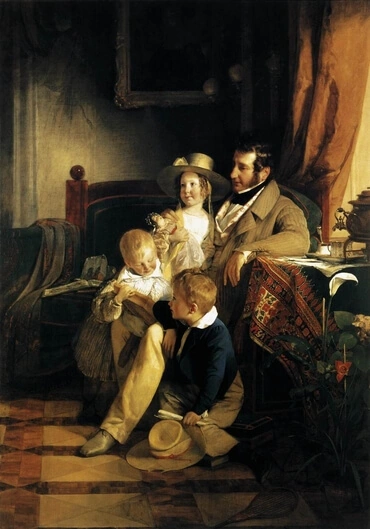2973. 'Which was in all its borders round about' means exterior cognitions. This is clear from the meaning of 'borders' and of 'round about' as things that are exterior, dealt with in 2936. Thus here '[every] tree which was in the borders round about' means exterior cognitions. Exterior cognitions have to do with the religious observances and matters of doctrine which constitute the external things of the Church, whereas interior cognitions have to do with matters of doctrine which constitute the internal things of the Church. What the external things of the Church are, and what the internal, has been stated several times already.
[2] Furthermore in various places in the Word mention is made of the middle or the midst and of the regions encircling it, as when the land of Canaan is referred to, 'the middle' is used to describe where Zion and Jerusalem are, while the areas encircling describe where the nations are who are round about. 'The land of Canaan' represented the Lord's kingdom, 'Zion' the celestial part of it and 'Jerusalem' the spiritual, and there Jehovah or the Lord had His dwelling-place. The things that were round about, even to the borders, represented celestial and spiritual things spread out and derived in order from there. Where the furthest boundaries lay, there the representatives of celestial and spiritual things ended. Those representatives had their origin in the things that existed in the Lord's kingdom in heaven, where the Lord as the Sun is in the middle, from where all celestial flame and spiritual light radiate. Those nearest to Him dwell in the brightest light, while those who are more remote dwell in less light, and those who are the most remote in the least bright. At this point lie the borders where hell, which is outside heaven, begins.
[3] With celestial flame and spiritual light the position is that the existence of celestial things which are forms of innocence and love, and spiritual things which are forms of charity and faith, is proportional to the heat and light that is received, for those things are the source of all heat and light in heaven. This then is why 'the middle' means that which is inmost, and the encircling regions that which is outermost; and the spacing of the things that radiate in order from the inmost to the outermost is determined by their degree of innocence, love and charity. It is similar with each individual community of heaven. Those members in the middle are the best of its kind, and the love and charity of that kind becomes correspondingly less as these become more remote, that is, as such love and charity exist with members away from the middle.
[4] It is also similar with man. The inmost part of him is where the Lord resides with him, and from there governs the outlying parts. When a person permits the Lord to bring order to the outlying parts so that these correspond to the inmost parts, his state is such that he can be received into heaven, and the inmost, the interior, and the external parts of him act as one. But if the person does not permit the Lord to bring order to those outlying parts so that they correspond, he moves away from heaven, as far away as he is from permitting the Lord to bring that order to them. The fact that man's soul resides in the middle or inmost part of his being and the body in the outlying region or outermost parts is well known, for the body is that which surrounds and clothes his soul or spirit.
[5] With those in whom celestial and spiritual love reigns, good from the Lord flows in by way of the soul into the body, as a consequence of which the body becomes full of light, but with those in whom bodily and worldly love reigns, good from the Lord cannot flow in by way of the soul into the body. Instead their interiors are engulfed in darkness, as a consequence of which the body too becomes full of darkness, according to the Lord's own teaching in Matthew,
The lamp of the body is the eye. If the eye is sound, the whole body is full of light. If the eye is evil, the whole body is full of darkness. If therefore the light is darkness, how great is the darkness! Matthew 6:22-23.
'The eye' means the understanding part, which belongs in the soul, 2701.
[6] But matters are worse still with people whose interiors are 'darkness' while their exteriors seem to be 'full of light'. They are such as outwardly pretend to be angels of light but inwardly they are devils. They are referred to as 'Babel'. These people, when the things that are round about are destroyed, are carried headfirst into hell. This was represented by the city of Jericho whose walls fell down, and the city was given to destruction, after the priests had gone round it seven times with the ark, and had sounded their trumpets, Joshua 6:1-17. The same is meant in Jeremiah,
Set yourselves against Babel round about, all you who bend the bow. Raise a shout over her round about, she has given her hand, her foundations have fallen, her walls have been destroyed. Jeremiah 50:14-15.
From this it is now evident what 'round about' means. Reference is also made several times in the Word to 'the encircling regions', as in Jeremiah 21:14; 46:14; 49:5; Ezekiel 36:3-4, 7; 37:21; Amos 3:11; and elsewhere. By 'the encircling regions' is meant the things that are exterior, concerning which, in the Lord's Divine mercy, more will be said elsewhere.







